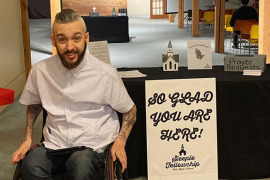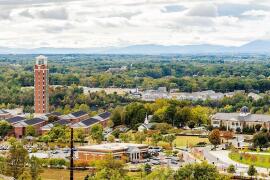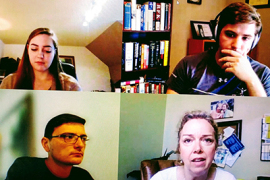Culture and Christianity: Standing Firm on God's Truth in a Postmodern Society
In today’s culture of moral relativism and political correctness, standing firm on the truths found in Scripture and living a life of faithfulness to God can seem like a daunting task — particularly for young Christians.
To equip students to think critically about relevant issues from a biblical perspective and to confidently engage with culture, Liberty University weaves a Christian worldview through the curriculum of every degree program. Each class, lecture, and discussion of contemporary issues is framed through a biblical lens, demonstrating how every area of life, from nursing to government, is a purposeful part of God’s plan for His creation.
“At Liberty, we help students live and thrive and share their faith in the culture in which we live,” says Dr. Mark Allen, Th.M., D.Min., Ph.D.; Professor and Chair of Biblical Studies, Rawlings School of Divinity. “We help students think on a deeper level; we help them reflect more deeply on culture.”
Now more than ever before, Christians are facing cultural challenges, Allen explained, from “tip of the iceberg” issues like gender identity, religious liberty, and racism to deeper issues like experiential individualism, religious apathy, and modern pluralism. A recent Barna study found secular worldviews have “crept into Christians’ perspectives” as truth is redefined.
Astonishingly, just 17 percent of Christians who consider their faith important and attend church regularly actually have a biblical worldview, Barna found. Nearly four in 10 (38%) practicing Christians are sympathetic to some Muslim teachings; 61% agree with ideas rooted in New Spirituality; 54% resonate with postmodernist views; 36% accept ideas associated with Marxism, and 29% believe ideas based on secularism.
“At one time, Christianity dominated the Western world, making it easier to believe in the faith,” Allen said. “But today that is no longer the case. [In popular culture], we feel that all different religions, all faiths, all experiences, or my individual experience, are equally valid in our modern, pluralistic culture. We live in the age of the therapeutic; sin is no longer a problem — it’s a sickness. At Liberty, we want to help our students think through these deeper cultural issues and actually be able to have good conversations with others at a deeper level.”
As the influence of Christianity on society seems to diminish, Liberty University empowers the next generation by helping them gain the skills and knowledge to become critical thinkers and effective communicators. The way we engage culture as followers of Christ matters, Allen said. Instead of forcefully presenting one’s views, it’s important to ask questions and listen to one another.
“There’s a great divide in our nation right now, especially over political issues,” he said. “At Liberty University, our first commitment is to the Kingdom of God, to serving God, to living out our faith. When we think of our faith, we think of a crucified Savior, a humble Savior on the cross who took on flesh and blood and walked around in our world and connected with us. We teach our students to walk in the skin of another person; we all live in various socioeconomic worlds, we have different racial worlds, we have different political worlds, and we want to teach our students to be better listeners and to understand the framework.”
He continued, “We don’t want to look at culture as our enemy; we look at the culture as, these are our friends, our family, our coworkers. We want students to be able to ask good questions of their friends so they can understand those with whom they are sharing the faith so they can take the Gospel and meet the need of their fellow students. We help students to reflect and think deeper — to be able to communicate and have better relationships, more redemptive friendships, in this culture in which we live.”
When students have a deep understanding of their own beliefs, Allen said, they are able to express aspects of the Christian worldview which affect hot-button issues like human dignity, the plight of the poor and vulnerable, and ethical decision-making.
“What we would like our students to be able to do is actually to listen and to learn from the other side, while deeply understanding their own Kingdom convictions so they can understand that there are some points of connection that you and I have,” he said. “Having understood the person well, then we can say, ‘Did you know that some of your views on human freedom and your opinions against human trafficking have actually been generated out of the Christian belief in the image of God and that every person is to be loved and valued?’”
“We teach our students to have a big picture, big narrative view of who God is so they can demonstrate to other people that the Christian faith does truly lead to human flourishing and has more explanatory power than other worldviews,” he continued. “But it begins with listening.”
By integrating faith and learning across the entire curriculum, Liberty University empowers students to be leaders in their local and global communities while serving as culture engagers for the sake of the Gospel.
“At Liberty University, we teach a Gospel-centered — which is an others-centered — way of engaging with others, whether that is in the political realm or that is in other realms of society,” Allen said. “We’re willing to listen, we’re willing to understand their worldview, their framework, their perspective so we can help lead them to the truth of the cross of our Lord Jesus Christ.”
“But, we’re not going to compromise the Gospel, the cross, the resurrection,” he added. “That is the central message. That is the place we ultimately want to take people — to the message of the Gospel of Jesus Christ.”
Related:
Called to Counseling — Do You Need a License to Make a Difference?
>>>Request for Liberty University Online degree info now.





